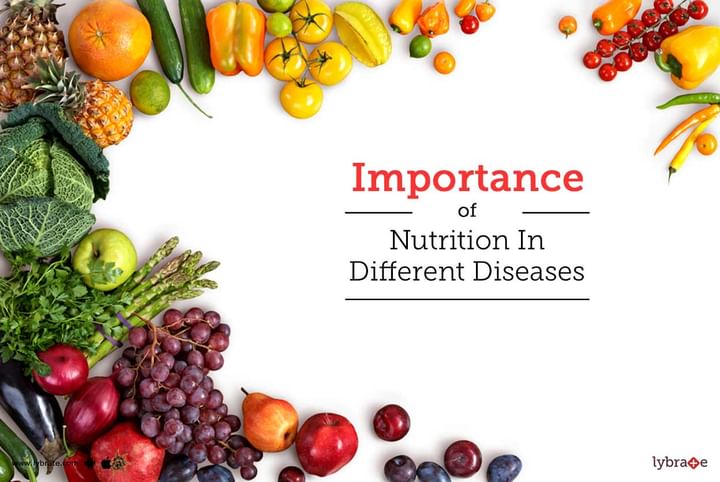Importance Of Nutrition In Different Diseases
Health is much more than the absence of disease. It is a positive quality, emphasizing intellectual, physical, social, emotional, and spiritual well-being. Optimum nutrition, providing all nutrients in both kind and in right amount, is the cornerstone of good health and the cutting edge of prevention. The foods we eat, and the nutrients they should provide, are the most important continuing environmental factors influencing our growth, development, functional abilities, and health. How we structure our lifestyles, with proper nutrition, health habit discipline, and exercise programming, have a great influence on our personal health, and help us reduce our current medical care expenditures.
A balanced diet containing required amount of carbohydrates, proteins, vitamins, minerals and required fats can help your body keep diseases at bay. Here are the major findings -
- Cardiovascular Diseases: Cardiovascular diseases, the major killers worldwide, are to a great extent due to unbalanced diets and physical inactivity. The increasing pollution and unhealthy eating habits, put you at a risk of developing heart diseases and strokes. By consuming less trans-fats, saturated fats, salt and alcohol, you can stabilize your blood pressure which causes heart attacks. Add more of green leafy vegetables and lean protein to your meals to make them healthy and nutritious.
- Osteoporosis: A person with a deficiency of calcium suffers from osteoporosis which makes your bones brittle and prone to cracking and breakage. However, by adding more dairy products which are rich in calcium, you will be able to keep this condition at bay. By eating foods rich in Vitamin D such as fatty fishes, cheese, mushrooms and tofu, you can ensure strong bones which aren’t prone to breakage.
- Diabetes: Because the insulin production is low in diabetic patients, they are already advised to avoid sugary foods. However, a diabetic patient can add certain food items to the diet which can help him/her lead a healthy life. Foods such as Neem juice, pulses, high fibre vegetables, fruits, milk and whole grains can help a person with Type 2 diabetes live a healthier life.
- Constipation: To prevent constipation it is important to include foods in your diet that are high in fibre. Wholegrain cereals, wholemeal bread, fruit, dried fruit, dried peas, beans and lentils are excellent sources of fibre. Fibre and water work well together so make sure you consume enough fluids throughout the day to help prevent and alleviate constipation.
- Acidity: Eating too much animal protein causes sulfuric acid to build up in the blood as amino acids are broken down. Eat plant foods to neutralize an acidic pH. Vegetables such as spinach, broccoli and beans or fruits such as raisins, bananas and apples are appropriate choices for neutralizing body pH.
- Renal Disease: A renal failure diet controls the amount of protein and phosphorus in your diet. You may also have to limit calcium, sodium, and potassium. A renal failure diet can help decrease the amount of waste made by your body, which can help your kidneys work better. It may also help to delay total renal failure. Your diet may change over time as your health condition changes.
Physical inactivity is already a major global health risk and is prevalent in the modern world, particularly among the urban poor in crowded mega-cities. Healthy diets and physical activity are key to good nutrition and necessary for a long and healthy life. Eating nutrient dense foods and balancing energy intake with the necessary physical activity to maintain a healthy weight is essential at all stages of life. Unbalanced consumption of foods high in energy (sugar, starch and/or fat) and low in essential nutrients contributes to energy excess, overweight and obesity. The amount of the energy consumed in relation to physical activity and the quality of food are key determinants of nutrition-related chronic disease.
However, this is just a basic concept of nutrition in aforementioned diseases. It is always recommended to consult an expert nutritionist or dietician to know the right diet for your disease. It will be according to your health, height, weight and the severity of the disease. Every individual's nutrition requirement is different. The nutritionist will recommend a diet plan that will help you maintain the level of severity of the disease you are suffering from. If you wish to discuss about any specific problem, you can consult a doctor and ask a free question.



+1.svg)
